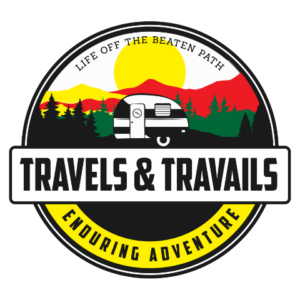In October 2019, a tragedy occurred in the RV camping community when the body of Michelle Butler, a full-time RV camper, was discovered in a shallow grave on Padre Island Beach near Corpus Christi, Texas. It was later discovered that Michelle and her husband had been victims of a heinous crime; they had been murdered, and their truck and travel trailer were stolen and transported over the nearby border to Mexico.
After hearing a story like this, you’re probably wondering, “How safe is RV camping?”
RV camping is generally very safe. However, there are risks associated with RV camping, such as the danger of crime, fire and carbon monoxide poisoning, natural disasters, wildlife encounters, and driving accidents. But there are ways to mitigate these risks.
Read on to find out more about the perils of RV camping and the ways you can make your trip safer.
Potential Safety Concerns
Personal Crime Threats
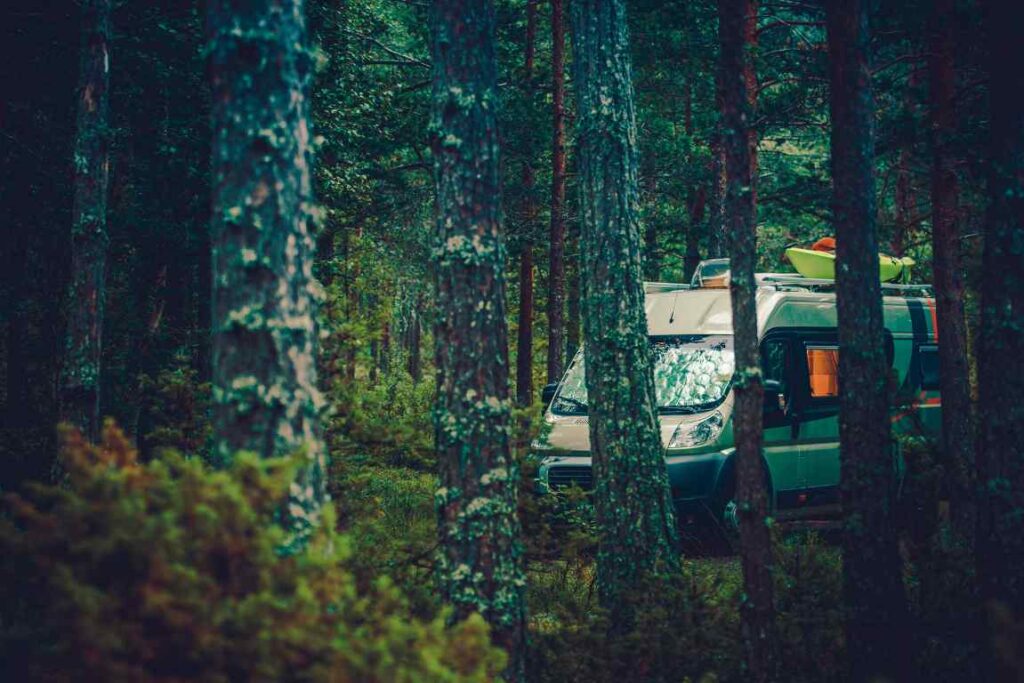
While the risks of personal crime are comparably low for RVers, they aren’t nil. You should be aware of the various personal crime threats that can be a concern.
RVs can be isolated in some camping spots, making them more vulnerable to violent crimes such as assault, robbery, and even murder. Criminals may specifically target individuals who appear to be tourists or are traveling in unfamiliar areas.
Some areas have a higher crime rate and, therefore, present a higher likelihood that you’ll come into contact with dangerous people. And then, there is the risk of people losing their cool or doing stupid things that can cause injury to you or your family.
There are several steps you can take to mitigate the risk of personal crime threats. Firstly, always be aware of your surroundings and avoid high-risk areas, especially at night.
Install and use security devices such as deadbolts, alarms, and motion-sensor lights in your RV to deter potential intruders.
A dog can be a good deterrent for would-be criminals. Read my article to know more about how dogs can make camping safer.
Keep valuable items out of sight and consider using a safe or lockbox to secure important documents and cash.
When parking in a new location, it’s important to do your research and choose a safe and well-lit area. Avoid high-crime areas.
Don’t engage with idiots. There’s always that camper who is drunk and playing music until the wee hours. Don’t engage with them. If you run into a problem, contact the campground host or call the local authorities.
Consider joining an RV club or community where you can network with other RVers and share safety tips and information. Even online groups like Facebook or Reddit groups can be helpful resources.
Finally, be cautious of strangers and never open your door to someone you don’t know. By being proactive and taking these safety measures, you can reduce the risk of personal crime threats and enjoy a safe and secure RV lifestyle.
If you’re a single person camping by yourself, read our article on solo camping.
Risk of Fire and Carbon Monoxide Poisoning
You should be aware of the risks of fire and carbon monoxide poisoning. These hazards can be caused by faulty wiring, propane leaks, or even cooking inside the RV.
In some cases, RVs have caught fire and caused significant damage or even loss of life. Carbon monoxide poisoning can also be a concern when RV camping.
This gas can build up inside the RV if there is a problem with the propane system or exhaust. Symptoms of carbon monoxide poisoning include headache, dizziness, nausea, and fatigue. In severe cases, it can lead to unconsciousness and even death.
There are several steps you can take to mitigate the risk of fire and carbon monoxide poisoning. First, make sure your RV’s smoke and carbon monoxide detectors are in good working order and replace batteries regularly. Install additional detectors if necessary, especially in sleeping areas.
Next, be cautious when cooking, and never leave the stove unattended. Use a fire extinguisher in case of emergency and have it easily accessible.
Check all electrical connections and cords for signs of wear and tear, and use surge protectors to prevent electrical fires.
Finally, never use portable propane heaters or generators inside your RV, and make sure your propane tank is turned off when not in use.
Threat of Theft and Break-Ins

You should also be aware of the risks of theft and break-ins when RV camping. Your valuable possessions and electronics make them an attractive target for thieves. You can run into this when parked in campgrounds or even when on the road at rest stops. Thieves can easily break into an RV and steal your valuables.
In addition to the risk of theft, there is also the threat of a break-in. These types of crimes can happen anywhere, but RV camping can increase the chances of becoming a victim due to the isolated nature of some camping spots and the possibility of encountering dangerous individuals.
There are several things you can do to reduce the threat of theft and break-ins.
First, always lock your RV’s doors and windows when you leave, even if you’re just stepping away for a short time. Keep your RV door locked when you are inside, even during the day.
Consider adding a security system or surveillance cameras to deter potential thieves. When parking your RV, choose well-lit and populated areas, and if possible, park within view of security cameras or a security guard.
Keep valuables out of sight, and consider using a safe to store valuable items.
Finally, get to know your neighbors and the area you’re staying in, and report any suspicious activity to campground staff or local authorities.
Hazards of Severe Weather and Natural Disasters
It’s always a good idea to check the weather for the location where you are traveling. Each area has a propensity for its own particular hazards, so keep that in mind.
The most important thing you can do is be prepared. One way to be prepared is to have an understanding of the area. When you get to your location, review maps of the area so that you are familiar with the quickest exit routes in case you have to evacuate.
Develop an emergency plan for your RV travels that includes knowing the location of the nearest emergency shelters, having emergency supplies such as food, water, and first aid kits on hand, and having a communication plan with your travel companions and local authorities in case of emergencies.
In an RV, you are more exposed to severe weather and natural disasters than you would be in a home. There are several types of natural disasters that you should be aware of when RV camping.
Thunderstorms
Lightning strikes can cause damage to your RV’s electrical systems, and high winds can knock over trees or other structures that could cause damage to your RV.
If the weather forecast calls for a severe thunderstorm, consider leaving the area for a different campground or campsite.
If you can’t leave or if the thunderstorm is mild, avoid touching any metal surfaces or objects inside your RV, including plumbing fixtures and appliances, as lightning can travel through metal. If possible, unplug any electronics and appliances to protect them from power surges.
Stay away from windows and doors, and avoid taking a shower or bath, as water is a conductor of electricity.
If you’re in a low-lying area or near a body of water, be aware of the risk of flash flooding and consider moving to higher ground.
Finally, stay informed about weather conditions by listening to local radio or TV stations or using a weather app on your phone.
Tornadoes
A tornado will leave you vulnerable if you are in your RV. Tornadoes can also cause significant damage to RVs. In addition, debris carried by high winds can cause damage to your RV.
A tornado warning means that there is imminent danger to life or property. A tornado watch means that conditions are right for a tornado, and you need to be ready for the possibility of a tornado warning.
If you are notified of a tornado warning, take shelter immediately. If you’re in an RV park, know the location of the tornado shelter when you arrive. If possible, move to a designated storm shelter or a sturdy building with a basement.
If you do not have access to a storm shelter or other sturdy building, and it’s safe to do so, drive to an area with a storm shelter.
For more information about tornados, visit the NOAA website.
Hurricanes
As with tornados, you might encounter conditions where a hurricane watch or a hurricane warning is issued.
A hurricane watch is a situation where wind speeds exceeding 74 miles per hour are possible. A hurricane warning happens when wind speeds exceed 74 miles per hour for a sustained period.
In the event of a hurricane, watch, pack up and prepare to leave. Begin making plans for a route out of the area. Pay close attention to instructions given by local officials and be ready to leave as soon as instructed.
In the event of a hurricane warning, NOAA recommends that you leave the area immediately, as directed by officials.
For more information about hurricanes, visit the NOAA website.
Wildfires
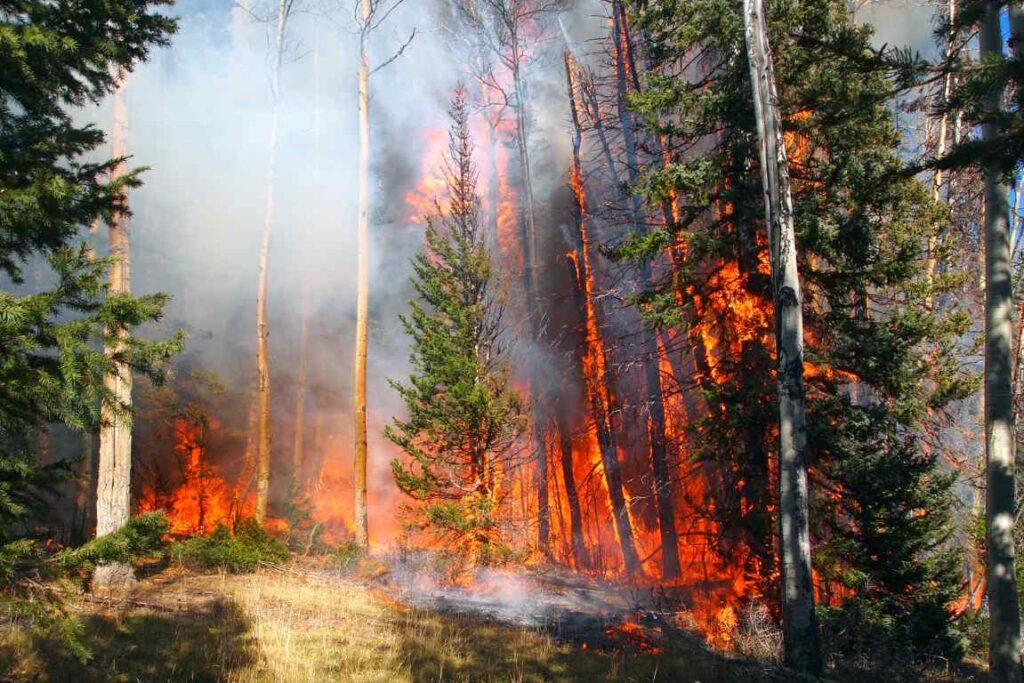
In 2021, we were evacuated from our home during the Caldor fire. Fortunately, we had our Casita, our little home on wheels, that we could live in for a time.
Wildfires can appear suddenly and without warning. When we had to evacuate our home during the Caldor fire, we had about two hours to get packed and get out. The residence of local Grizzly Flats had just minutes.
We had a plan to evacuate with our trailer and were ready to go when the time came for us to evacuate. Plus, we knew all the exit routes. Wildfires can be unpredictable. It’s important to have optional ways to exit from your location.
Floods
RVs parked in low-lying areas or near rivers are at risk of flooding during heavy rainfall or spring snowmelt.
Flash floods are one of the scariest flood hazards because can occur suddenly. They are typically caused by heavy rainfall, rapid snowmelt, or dam/levee failures.
They can quickly overwhelm rivers, streams, and low-lying areas, resulting in dangerous and fast-moving water currents.
If you are in an RV during a flash flood, immediately move to higher ground and avoid driving through flooded areas. Stay tuned to weather updates and follow evacuation orders. Seek shelter on higher ground, and do not attempt to cross flooded roads or bridges.
We had a really wet winter with lots of flooding this year. I was surprised by the number of people who attempted to cross the water in flooded areas. Several people died when they attempted to cross a flooded area, and their cars were completely submerged.
Landslides and Avalanches
RVs parked in areas with unstable soil or near steep slopes are at risk of landslides, which can cause significant damage or even destruction of your RV and threaten your life if you are inside.
Landslides and avalanches occur when large masses of soil, rock, or snow suddenly move downhill due to gravity and other factors such as rainfall, snowmelt, seismic activity, or human activities. These natural disasters can be triggered by various factors and can happen suddenly, posing a significant threat to people and property.
Research and be aware of the areas you plan to visit in your RV. Check local geological and weather conditions, as well as any landslide or avalanche warnings or advisories issued by local authorities.
Avoid parking or camping in areas that are prone to landslides or avalanches, such as steep slopes, unstable terrains, or areas with a recent landslide or avalanche history.
Observe road closure signs, barricades, or warnings indicating landslide or avalanche-prone areas. Do not attempt to drive through or park in these areas, even if they appear accessible.
Be cautious and avoid traveling during extreme weather conditions that may trigger these events.
Keep an eye out for signs of potential landslide or avalanche activity, such as cracks in the ground, leaning trees, or unusual sounds. If you notice any warning signs, evacuate the area immediately.
Stay updated with local authorities’ instructions and follow any evacuation orders or warnings issued by them. They have the latest information and can provide guidance on how to stay safe during landslides or avalanches.
Earthquakes
RVs parked in areas prone to earthquakes are at risk of damage from ground shaking or landslides triggered by the earthquake.
Dangers of Wildlife Encounters

It’s important to understand the dangers of wildlife encounters before you enter an area. Research the area where you will be traveling. Research the types of wildlife you might encounter and the risks associated with the encounter.
Two years ago, we traveled to Yellowstone, Grand Tetons, and Glacier National Parks. All of these national parks have dangerous animals that have killed or maimed people.
While these encounters are rare, they do happen, and it’s important to be prepared.
In Montana in 2021, a grizzly bear pulled a cyclist from her tent and killed her. It was later found that the woman had food in and around her tent.
To know more about dangerous animals, read our article.
Safety Risks of Driving an RV
Driving an RV presents several safety risks. One significant risk is the increased size and weight of an RV compared to a standard passenger vehicle, which can result in reduced maneuverability and longer stopping distances.
Another risk is driver fatigue due to long hours on the road, which can impair reaction times and decision-making abilities. RVs may also have blind spots and limited visibility, posing challenges for changing lanes and parking.
Additionally, overloading an RV with passengers or cargo can impact its stability and increase the risk of accidents. Proper maintenance and inspection of the RV’s mechanical components, such as brakes, tires, and suspension, is crucial to avoid potential safety hazards.
Finally, navigating unfamiliar roads, dealing with adverse weather conditions, and driving on uneven terrain can further add to the safety risks of driving an RV.
Specific Safety Considerations for Different Types of RV Camping
Depending on the type of camping you do, you may run into different types of safety issues.
RV Camping In Parks and Campgrounds
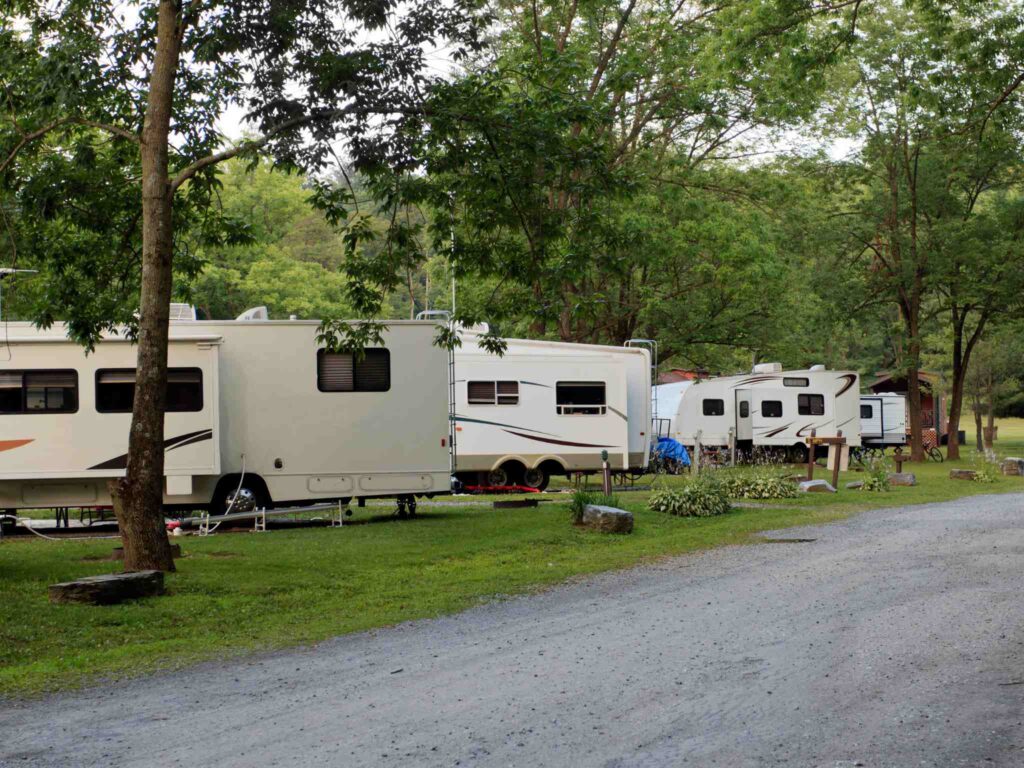
When camping in RV parks or campgrounds, there are specific safety considerations to keep in mind. First and foremost, it’s essential to follow all posted rules and regulations, including speed limits and guidelines for parking and hookups.
It’s also crucial to be mindful of other campers and respect their privacy and space. When using electrical hookups, make sure to adhere to proper usage guidelines to avoid overloading circuits and causing electrical hazards.
Be cautious with campfires, following any fire restrictions or guidelines in place and never leaving a fire unattended. Keep children supervised at all times and be aware of potential hazards such as uneven terrain, bodies of water, or wildlife in the area.
Properly store food and dispose of trash to prevent attracting wildlife to the campsite. Familiarize yourself with the location of emergency exits, fire extinguishers, and first aid kits within the campground.
Boondocking Safety
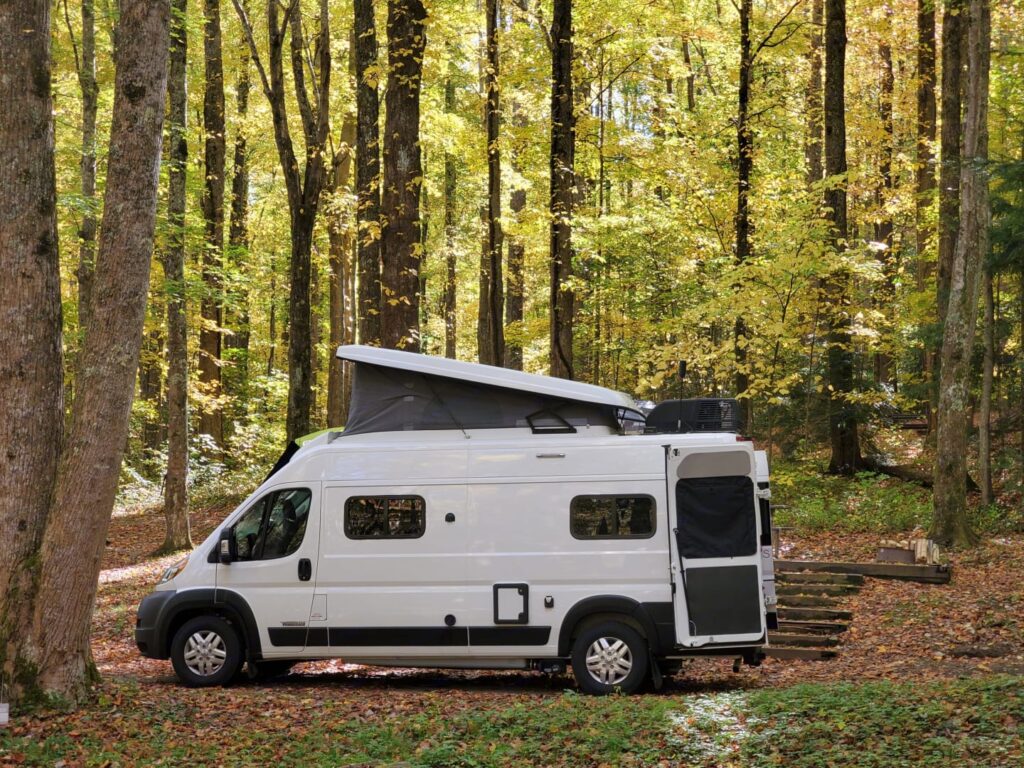
When boondocking, or camping in remote areas, there are several special safety considerations to keep in mind.
First, it’s crucial to research and select a safe and legal boondocking location, preferably on public lands or private properties with proper authorization. If you’d like to know more about the laws regarding free camping and boondocking, read this article. Be aware of any local regulations, restrictions, or permit requirements that may apply to the area.
Additionally, boondocking often means being self-sufficient, so ensuring you have ample supplies of water, food, fuel, and other necessities is vital. Have a backup power source, such as a generator or solar panels, to avoid running out of power. This article explains how to maximize your boondocking stay.
Safety measures like having a first aid kit, fire extinguisher, and emergency communication devices, such as a satellite phone or a locator beacon, are also essential.
Be cautious of potential hazards in the area, such as uneven terrain, wildlife, or extreme weather conditions, and take appropriate precautions. It’s also important to inform someone of your whereabouts and travel plans in case of emergencies.
Being mindful of Leave No Trace principles, properly disposing of trash, and minimizing your impact on the environment is also crucial when boondocking.
Finally, always exercise caution and use common sense when interacting with other individuals or groups in remote areas. Read my article about boondocking tips that can save your life.
Conclusion
While RV camping can be a fantastic way to explore the great outdoors and enjoy the freedom of the open road, it also comes with safety risks that need to be considered. Properly maintaining your RV, following posted rules and regulations, being mindful of potential hazards, and being prepared with necessary supplies and emergency measures are all critical to ensuring a safe and enjoyable RV camping experience. By prioritizing safety and being responsible campers, you can minimize risks and create unforgettable memories on your RV camping adventures.
